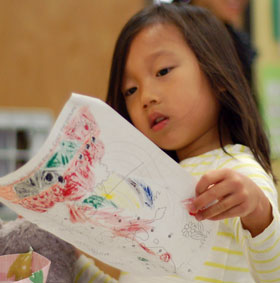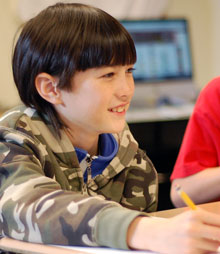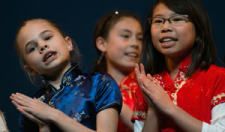Self-Study: School Culture
Since the school’s founding in 1990, ISP has brought together people from many countries and backgrounds for the shared mission of developing bilingual, global citizens. This common purpose has drawn staff and families together with a culture of community and support for one another. Thanks to the school’s small classes, students and teachers develop very close relationships and affection that lasts well beyond the school year and often beyond a child’s graduation. With today’s 490 students and 82 staff members, the close-knit culture still exists, though mostly within a student’s class, track or grade. To help knit the entire community together, the school is working toward an intentional school culture based on our mission and the International Baccalaureate (IB) learner profile attributes and attitudes.
 The goal is for the IB attitudes and attributes to guide all interactions at ISP – between students, between students and staff, and between all adults whether staff, parents or trustees. Students are explicitly learning about and practicing these expectations through collaborative problem-solving and reflection, multi-grade assemblies, special events, interactive bulletin boards, library classes, and, most challenging, on the playground, in hallways, and during transition times. Upper grade students have specialist classes with peers from other language tracks, which has improved their acceptance of individual and group differences. In 2012-2013, ISP engaged an outside consultant and began an active focus on educating staff and students about peer aggression and bullying prevention. This focus has waivered in the current school year due to other program priorities, but will be re-energized in the coming school year. The overall goal is to help students bridge the Learner Profile traits from school to home, community, and throughout their lives.
The goal is for the IB attitudes and attributes to guide all interactions at ISP – between students, between students and staff, and between all adults whether staff, parents or trustees. Students are explicitly learning about and practicing these expectations through collaborative problem-solving and reflection, multi-grade assemblies, special events, interactive bulletin boards, library classes, and, most challenging, on the playground, in hallways, and during transition times. Upper grade students have specialist classes with peers from other language tracks, which has improved their acceptance of individual and group differences. In 2012-2013, ISP engaged an outside consultant and began an active focus on educating staff and students about peer aggression and bullying prevention. This focus has waivered in the current school year due to other program priorities, but will be re-energized in the coming school year. The overall goal is to help students bridge the Learner Profile traits from school to home, community, and throughout their lives.
Parents are a critical part of the school culture, and generally have good relationships with teachers and administrative staff. Parents have access to staff members to discuss issues and concerns of any kind, and staff members try to be available for casual conversation as well. Parents contribute significant volunteer hours to make many school activities possible, assisting with special projects, chaperoning field trips, providing expertise as guest-speakers, arranging class parties, organizing school events, and supporting the school, teachers and students in innumerable ways. The school is continually working on various events and communication efforts to help parents participate in and stay informed about school life. Unfortunately, for 2013-2014 no parents stepped up to provide leadership for the Parent Teacher Organization, more recently known as the Parent Network. The staff hopes to work with parents to reestablish an active Parent Network organization. In addition, we are hopeful that future facilities improvements will provide more space for parents to meet socially and for volunteer efforts.
 For faculty, the school culture generally engenders warm connections, and staff members work together to address student needs. The focus of faculty interaction is collaborative planning. Teachers meet weekly to collaborate in grade level teams and often plan joint field trips and guest speakers. Specialists also work together and with homeroom teachers to link into units of inquiry and develop special projects across disciplines. Nevertheless, interacting across linguistic and cultural differences can be challenging. Lack of time can make it difficult to form relationships with teachers of different grades and tracks. Staff members often develop the closest bonds with others who have the same first language.
For faculty, the school culture generally engenders warm connections, and staff members work together to address student needs. The focus of faculty interaction is collaborative planning. Teachers meet weekly to collaborate in grade level teams and often plan joint field trips and guest speakers. Specialists also work together and with homeroom teachers to link into units of inquiry and develop special projects across disciplines. Nevertheless, interacting across linguistic and cultural differences can be challenging. Lack of time can make it difficult to form relationships with teachers of different grades and tracks. Staff members often develop the closest bonds with others who have the same first language.
There are several initiatives underway to strengthen staff relationships, increase transparency, reduce miscommunication, and facilitate better collaboration. The Loop is a new weekly staff news bulletin which provides structured, timely information and updates to all staff members. ISP is developing a communications handbook with guidelines for clear communications for our unique multilingual staff. The school also has a goal to develop a formal staff mentoring program, to provide on-going, reliable mentoring for new staff members throughout their first year. More social events this year are helping staff members get to know one another off campus. For the future, staff interactions will be aided by facilities expansion that provides office space for all administrative staff members, a staff break room, and group meeting spaces.
 For the community as a whole, school-wide events are a rich ISP tradition and an important part of school culture. Each school year begins with the Handshaking Ceremony, where every student proceeds through a welcome line and shakes hands with every teacher and administrative staff member. In 2013, the Handshaking Ceremony was an all-school spirit day, with all students and staff wearing ISP t-shirts. All students participate in the fall costume parade in October, hundreds of parents participate in the November ISP auction, and parents and grandparents join students for “Read in your Pajamas Day” on the last day of classes before winter break.
For the community as a whole, school-wide events are a rich ISP tradition and an important part of school culture. Each school year begins with the Handshaking Ceremony, where every student proceeds through a welcome line and shakes hands with every teacher and administrative staff member. In 2013, the Handshaking Ceremony was an all-school spirit day, with all students and staff wearing ISP t-shirts. All students participate in the fall costume parade in October, hundreds of parents participate in the November ISP auction, and parents and grandparents join students for “Read in your Pajamas Day” on the last day of classes before winter break.
February brings the ISP International Festival, where every class presents a performance demonstrating their track language and culture. In March, the fifth grade students leave for Capstone trips to Japan, China and Mexico. They present their cross-cultural research projects to the entire community in April at an exciting two- exhibition on campus. As the year is rounding up, every student exhibits at the art show in May, students volunteer to participate in the Talent Show in early June, and fourth grade families organize a graduation breakfast to honor the graduating 5th graders. Popsicle and hot chocolate socials in the playground round out the all-school events at various times throughout the year. Finally, the school year ends with a different kind of Handshaking Ceremony, where all students shake hands with the graduating students and wish them well.
